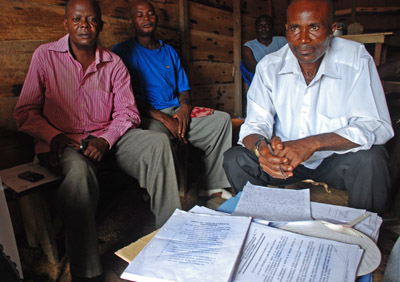
In a post last week, we covered a recent Congressional hearing on the Dodd-Frank Wall Street Reform Act’s section 1502 held by the House Financial Services Subcommittee on International Monetary Policy and Trade. Tom Murphy, a blogger on international development issues respected by many of us here at the Enough Project for his thoughtful and balanced criticism of some human rights advocacy initiatives, featured a response on his blog, A View From the Cave. In the post, Murphy criticizes the narrative of “Profits vs. People” (the title of Enough’s post) as dismissive of the legitimate debate about the positive and negative impacts that the conflict minerals provision is having on the mining sector in the Democratic Republic of Congo. Murphy takes particular issue with our description of two of the witnesses who testified at the hearing. He wrote:
Academic Laura Seay and activist Mvemba Dizolele also testified during the hearing. The Enough blog posts [sic] puts them into the 'profits' side of the argument saying that they sided with House Tea Party Caucus member and Chairman of the Subcommittee Rep. Gary Miller (R-CA), as well as with industry lobby groups such as the National Association of Manufacturers by testifying against 1502.
Such a connection is unfair to Dizolele and Seay. By taking a stance that someone is either on one side or the other, the Enough Project is dismissing genuine concerns about the implementation of 1502.
It’s important to note that Enough wasn’t involved with this event; indeed, we didn’t have a witness on the panel. But several members of our team attended the hearing and were alarmed to see how the conflict minerals provision is increasingly being employed in the fierce anti-regulatory debate in Congress today. By design, the hearing, entitled “The Costs and Consequences of Dodd-Frank Section 1502,” set up this “cost vs. impact” dichotomy, as several members of Congress recognized in their opening remarks and questions to the witnesses. For one example, Rep. Gwen Moore (D-WI), who said in her remarks:
I want to make sure we focus on the correct frame when we’re discussing the ‘costs’ of conflict minerals, not just being dollars and cents and extra paperwork and extra compliance officers among our manufacturers. … We’re talking about some of the most wretched and vile mass abuses of humans documented today …
We welcome reasonable debate about section 1502 and have participated in numerous panels and forums alongside critics of both the provision itself and Enough’s approach on the issue. There is no doubt that Dizolele and Seay’s intentions are, like our own, aimed at helping the people of Congo and not on the side of industry in this “profits vs. people” narrative. However, the fact remains that their testimony was used to bolster the bottom line message delivered by Congressman Miller in his closing comments: “And let's hope that the [DRC] government and the region does something about this problem, deals with the human rights. I hate to see the burden placed on the back of American businesses. It's not Congress paying, it's American business paying.” By accepting to appear as Republican witnesses at the hearing, it’s difficult to imagine Seay and Dizolele were naïve to the fact that their testimonies would be used to support this side of the debate.
Section 1502, which attained strong bi-partisan support in its previous life as stand-alone legislation as well as during conference committee hearings, unfortunately seems to be becoming a political football for some in Congress who seek to make it a poster child for anti-regulatory agendas. Both the positive and negative impacts of 1502 should continue to be researched and debated, but our hope is that the conversation occurs in a way that does not contribute to a narrative that dismisses the positive role and responsibility that both the U.S. government and corporate actors have to play in helping to address the crisis in eastern Congo.
I agree with Murphy that, when attempting to address complex foreign policy issues, simply “doing something is not sufficient.” But neither is letting complexities and the pursuit of perfection lead to inaction and the abdication of global responsibility we all have in helping to seek solutions.
If this “costs” approach—focused primarily on whether conflict minerals regulations are too burdensome for corporations but thinly veiled as a debate over whether 1502 is doing more harm than good for civilians in eastern Congo—continues to progress and leads to attempts at a repeal of Section 1502, it will set back years of work and political will generated for action—not just pertaining to Congo, but for any issue that seeks to address corporate responsibility and transparency as an entry point for tackling challenging human rights issues across the globe.
Photo: Members of a mining cooperative in Walikale, with copies of section 1502 of the Dodd-Frank bill (Enough / Laura Heaton)

